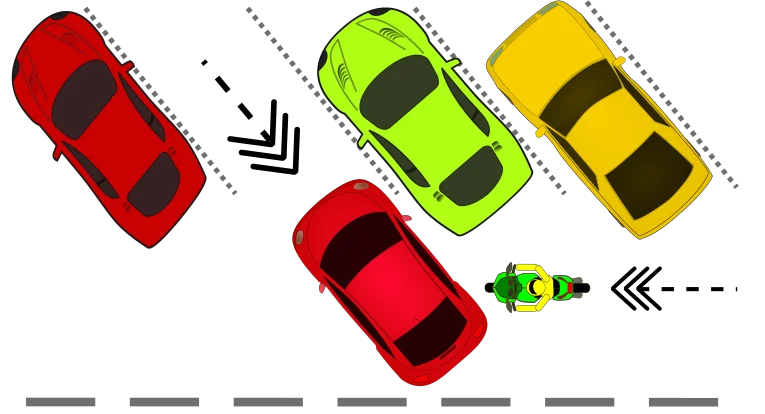Updated | October 17, 2025

Table of Contents
Introduction
Why do traffic accidents happen? Are these road mishaps preventable? This article describes seven causes of traffic accidents based on scientific evidence. Read on and be informed to avoid getting involved in difficult situations.
Driving along the highway yesterday after running my usual three miles and buying pan de sal a few kilometers from home, I noticed the long line of vehicles stopping in the middle of the highway. The vehicle movement is slow.
While approaching the spot with strobes of red light coming from two police cars, I saw a damaged motorcycle lying on one side of the road. On the opposite side, a man lies on his back with a blue towel on his face. He seems to be breathing anyway. The rescuers are waiting for him to recover from a state of shock.

I do not know how the accident happened. But I tended to attribute the cause to the driver as he is the one in control of the vehicle. By the driver, I mean the one who lies on the road or the one who bumped on him. It has something to do with decision making.
7 Causes of Traffic Accidents
Looking at the issue objectively and to get rid of my biases, a quick review of the literature revealed the following causes of traffic accidents.
- Drowsiness and lack of concentration due to sleep apnea (Teran-Santos et al., 1999)
- Use of psychoactive drugs like benzodiazepine (Barbone et al., 1998)
- Vehicles traveling at excess speed and drivers disobeying traffic signals (Ansari et al., 2000; Vorko-Jovic, 2006)
- Talking on cellular phones (Violanti and Marshall, 1996)(Note: small samples)
- Human errors in 70.7% of the accidents (Treat, 1980)
- Personality characteristics of the driver such as
- less control of hostility and anger;
- less tolerance of tension;
- less maturity,
- less conformity;
- more difficulty with authority figures;
- more hyperactivity;
- more belligerence; and
- a tendency toward risk taking (Tsuang et al., 1985)
- Blood alcohol concentrations (BACs) over 0.04% are associated with an increased accident rate (Borkenstein, 1974)
Precautions to Avoid Accidents
Based on the list of causes of traffic accidents, drivers must observe the following:
- Keep healthy. Undergo medical treatment if you have sleep apnea.
- Don’t drive when drowsy. Mind the labels of drugs that you use. Avoid those that cause drowsiness.
- Drive within limits. Drive at the manageable and prescribed speed limit in specific sections of the road.
- Mind the traffic signs. Take note of traffic signs. Stop when it says so. Carefully navigate a winding road if you see signs like that.
- Don’t be distracted by calls or messages. Avoid talking or texting on your cellular phones while driving. Stop and converse when you need to.
- Sharpen your senses. Be alert when driving using all your senses: eyes, ears, and even unusual odors like those coming from a handbrake you forgot to release when you started the vehicle.
- Be calm while driving. Don’t drive when you’re angry, tense, or emotionally disturbed.
- Don’t take unnecessary risks. If you encounter a flooded area of the road during your trip, don’t go through it without making sure your vehicle can handle the raging waters or successfully wade high water. Consider its capacity to do so.
- Don’t drink before you drive. Never drink alcohol when on a trip. Better don’t drink than be sorry. Either you’re caught and fined, or worse, you lose your driver’s license.
Take Home Message
Given that human error accounts for 70% of traffic accidents, drivers must bear in mind that life is precious. Keeping oneself healthy and sober while driving can prevent accidents that injure or kill people, or damage property. Driving a vehicle is an enjoyable experience that allows exploration of new places and convenience in reaching destinations to achieve specific purposes.
Drive safely. Your life as well as the life of others depends on you.
References
Ansari, S., Akhdar, F., Mandoorah, M., & Moutaery, K. (2000). Causes and effects of road traffic accidents in Saudi Arabia. Public health, 114(1), 37-39.
Borkenstein, R. F., Crowther, R. F., & Shumate, R. P. (1974). The role of the drinking driver in traffic accidents (The Grand Rapids Study). Blutalkohol, 11(Suppl), 1-131.
Mayou, R., Bryant, B., & Duthie, R. (1993). Psychiatric consequences of road traffic accidents. Bmj, 307(6905), 647-651.
Teran-Santos, J., Jimenez-Gomez, A., Cordero-Guevara, J., & Cooperative Group Burgos–Santander. (1999). The association between sleep apnea and the risk of traffic accidents. New England Journal of Medicine, 340(11), 847-851.
Treat, J. R. (1980). A study of precrash factors involved in traffic accidents. HSRI Research Review.
Tsuang, M. T., Boor, M., & Fleming, J. A. (1985). Psychiatric aspects of traffic accidents. Am J Psychiatry, 142(5), 538-546.
Vorko-Jović, A., Kern, J., & Biloglav, Z. (2006). Risk factors in urban road traffic accidents. Journal of safety research, 37(1), 93-98.
FAQ: Traffic Accidents: Seven Causes and Possible Solutions
1. Why do traffic accidents happen?
Traffic accidents often happen because of human error, which accounts for about 70% of all cases. Other causes include drowsiness, use of psychoactive drugs, overspeeding, disobedience to traffic signals, distractions like mobile phone use, poor emotional control, and alcohol consumption.
2. Are traffic accidents preventable?
Yes. Most traffic accidents can be prevented by addressing human factors such as fatigue, emotional distress, and substance use. Responsible driving habits and adherence to traffic rules play a crucial role in prevention.
3. How does drowsiness contribute to traffic accidents?
Drowsiness reduces a driver’s alertness and reaction time, increasing the risk of collisions. Sleep apnea and lack of rest are common causes of drowsy driving.
4. Can drugs or medications cause traffic accidents?
Yes. Psychoactive drugs such as benzodiazepines and certain medications that induce drowsiness impair a driver’s concentration and coordination, making accidents more likely.
5. Why is speeding dangerous?
Excess speed reduces the driver’s ability to control the vehicle and increases the severity of collisions. It also limits the time available to react to road hazards.
6. How does alcohol consumption affect driving?
Blood alcohol concentrations over 0.04% significantly impair judgment, coordination, and reaction time. Driving under the influence is a leading cause of road fatalities.
7. What personality traits increase accident risk?
Drivers who are aggressive, impulsive, intolerant of stress, or risk-taking are more likely to be involved in traffic accidents.
8. What can drivers do to avoid accidents?
Drivers can avoid accidents by staying healthy, avoiding alcohol and drugs, keeping calm, following speed limits and traffic signs, avoiding distractions, and maintaining full concentration while driving.


